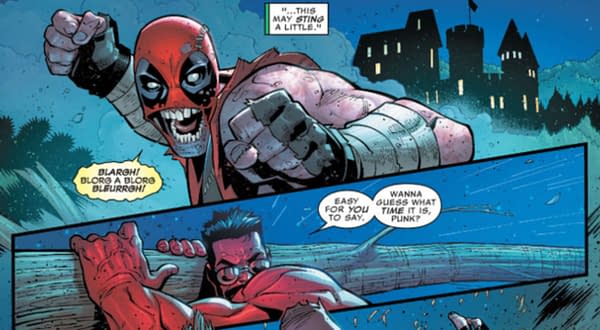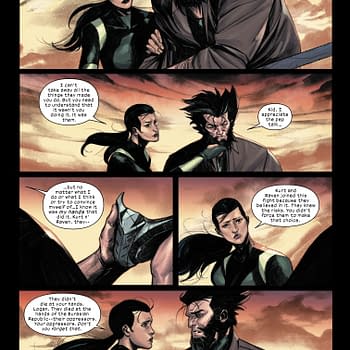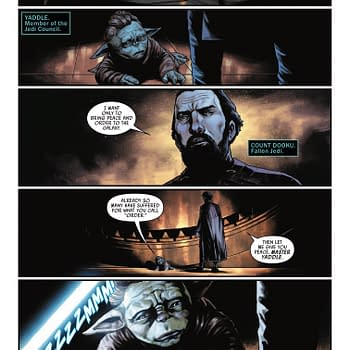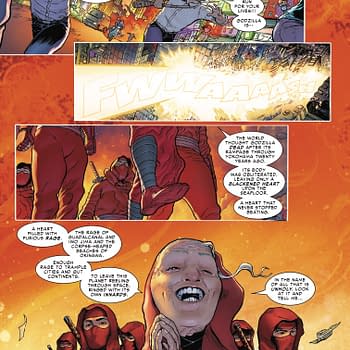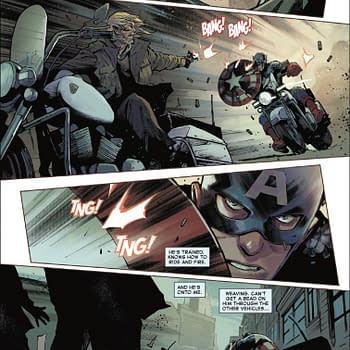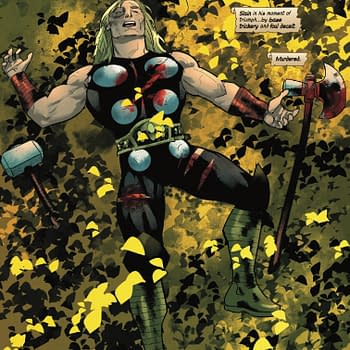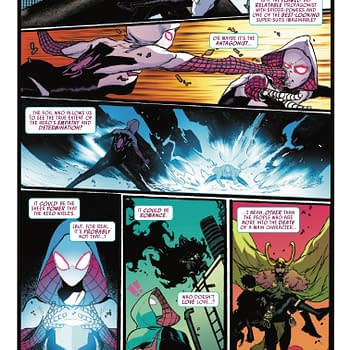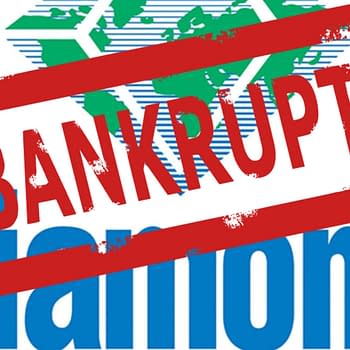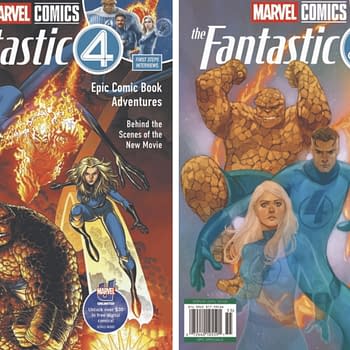Posted in: Comics | Tagged: brian bendis, Curt Pires, evan dorkin, fanboy rampage, jamal igle, jim zub, Matthew Rosenberg, matty from the block, peter david
Fanboy Rampage: Whose Job Is It To Sell Comics, Anyway?
Solving the woes of an ailing comic book industry is one of comicdom's favorite pastimes, with many a theory offered as to why any given direct market superhero comic book only seems to be able to sell to 100,000 or less readers, often far less, while superhero movies and television shows capture the imagination of the entire world. One theory often offered by comic book professionals is that readers who don't pre-order comics are responsible for comics being canceled, as a comic's fate hangs precariously in the balance over whether or not retailers know they can sell it months in advance.
As "The Great One" Brian Bendis tweeted in 2016:
Though Bendis later went on to change his mind and blame the media instead for promoting false narratives like "almost every week a truly wonderful, promising or crackling comic gets ignored & canceled." Hmm, wherever could they have gotten that idea?
cost to make the book, ancillary sales (trade, foreign, digital, bookstore) all of which is COMPLETELY ignored by most of the know it all analysts (because they have ZERO access to that info because its literally no ones business but the publishers), if the creators or publisher think a book on the bubble and on the cusp of finding an audience, if the book might sell to hollywood…
and i'll yell from the rooftops till i am blue in the face but every chart, every column, every report about comic sales is bogglingly incomplete. most info, including EVERYTHING i mentioned above is never included. it is info that can add up to a HUGE percentage of a books profitability. that is probably what is confusing you.
you're reading half reports. its like reading political poll numbers or domestic box office analysis :)
just enjoy your comics. comics are and should be fun for you.
Others have blamed trade-waiters for sealing the fate of quality monthly comics, such as legendary writer and amateur accountant Peter David, who wrote in 2014 on the cancellation of X-Factor:
All I did was write a book that got tons of positive write-ups. Which I guess is enough to encourage people to buy it when it comes out in trades, oblivious to the fact that books get cancelled when you do that. Whatever.
Others still place the blame on readers who pirate the books rather than pay for them, like Jim Zub, speaking of the at-that-time not canceled but eventually canceled Champions earlier this year.
But a new theory has entered the race, coming from someone who's spoken on this very topic before in defense of readers.
Let's play his theme song.
Don't be fooled by the contract he's got,
He's still, he's still, Matty from the Block!
OR IS HE?!
Superstar writer Matthew Rosenberg, who has previously dismissed the idea that readers must pre-order comics, has taken to Twitter to finally lay the blame for failed comics at the feet of those truly responsible!
…
What's that, dear reader? What do you mean, blame it on the publishers who prop up an insular, complex, and inaccessible direct market system that benefits only them by extorting existing readership for more money in the form of price hikes, double-shipping, super-mega-crossover events, variant cover ponzi schemes, and other myopic gimmickry rather than actually reaching out to the much-vaunted, some say mythical, "new comic book reader" with affordable prices and support for books that are given a chance to reach new readers outside the direct market by not canceling them before their first trade paperback is even released? Ha ha! That's just ridiculous. Stick to causing comics to fail by not pre-ordering them, waiting for the trade, or reading them illegally like a god damn criminal and leave this to the professionals, buster!
No, silly, Rosenberg knows upon whom lies the onus to bring new readers into comic book stores: the comic creators themselves!
Rosenberg tweeted:
Get more people into the shops… Get more people into the shops… Hmm… Have we considered a trap door on the sidewalk with a tube system that deposits them right in front of the racks? What if we captured the people in a very large net and then physically carried them into the shops? Oh! We've got it! How about comic book stores introduce a new, virally popular fast-food chicken sandwich? At least then they'd actually get some coverage from ComicBook.com.
It was a bold concept, one that opens up all sorts of intriguing possibilities, and it was met with spirited opinions, such as the enthusiastic endorsement of colleagues like Zac Thompson, Michael Moreci, and Marc Laming.
But others disagreed, like Jamal Igle, who says it's actually the format that's the problem, citing the impressive sales of comics to young readers in the bookstore market that dwarf those of even the most universe-shattering, nothing-will-ever-be-the-saming of super-mega-crossover events.
It's true. Personally, it took us years of hard work, indoctrination, and thousands of dollars worth of X-Men trade paperbacks to convince our very own children, who were born loving superhero movies, TV shows, and toys, to actually read and enjoy superhero comics. But with no prompting at all, they discovered and devoured on their own graphic novels like Smile and Dog-Man. It's almost as if getting an entire graphic novel to read for the cost of a single issue comic book (or for free at the library) which is geared and marketed toward actual young people today is somehow more satisfying than paying five dollars for one-fifth of a decompressed story that you need to wait half a year to read the conclusion of and can only buy in a specialized location that probably doesn't have a copy of the latest issue anyway unless you pre-ordered it because retailers can't afford lots of shelf copies since they're struggling to survive on the scraps of Immortal Hulk variant cover sales on eBay to gullible speculators while publishers owned by global megacorps take most of the profit and spend it on Donald Trump donations. Go figure.
Setting aside the blame game, Curt Pires responded simply to defend the besmirched honor of comics creators everywhere.
Even in the faraway land of Subtweet, the voices of comic creators rang out in response to Rosenberg's theory, with Evan Dorkin tweeting:
Meanwhile, Rosenberg responded to accusations that he was no longer, no longer Matty from the Block.
Do you smell that? That's the smell of credibility. No, wait, the dog farted. But still, it can't be argued that Rosenberg, a former indie darling who cut his teeth on the mean streets of Black Mask before landing his fancy Marvel contract and refusing to talk to us about Taylor Swift albums anymore, doesn't know what it's like to claw his way to the top through hard work and perseverance.
In the end, Rosenberg, who only recently returned to Twitter after several dozen hiatuses earlier this year, concluded:
Play his theme song.
Don't be fooled by the contract he's got,
He's still, he's still, Matty from the Block!
Fanboy Rampage was a blog by Graeme "Graham" McMillan dedicated to the funniest, most ludicrous and most inappropriate comic book back-and-forths online. McMillan has moved on now, becoming a proper journalist for the likes of The Hollywood Reporter and Wired but he gave permission to Bleeding Cool to revive his great creation.


